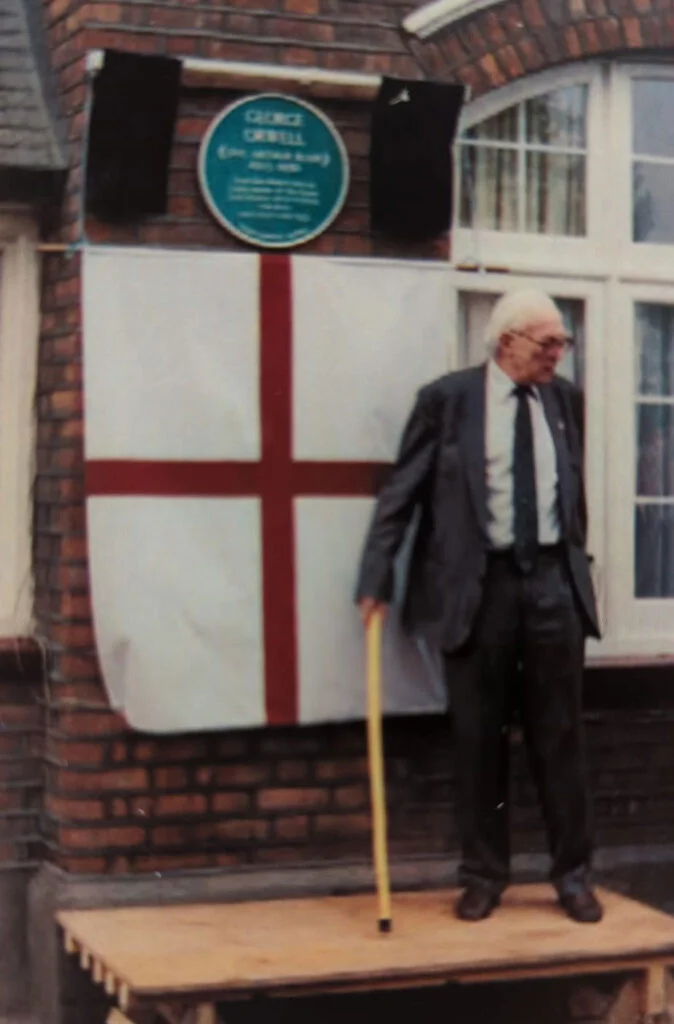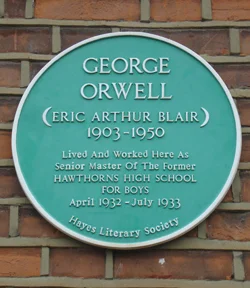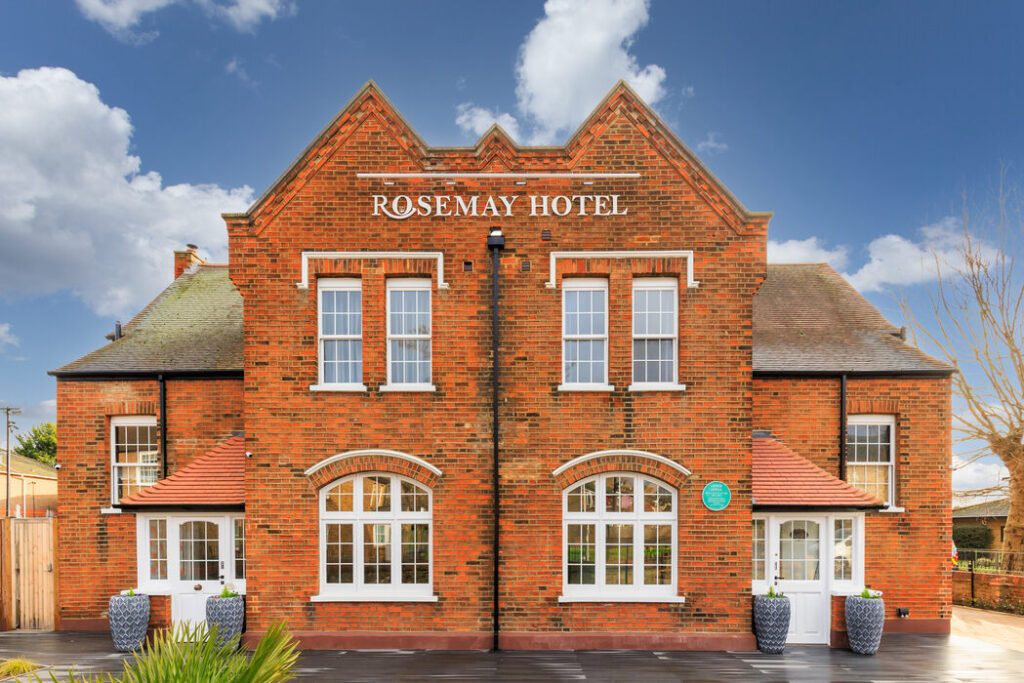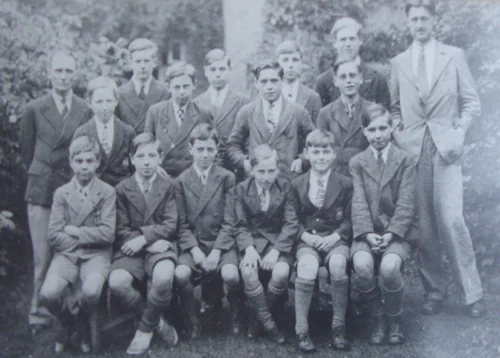The Rosemay Hotel has a unique and culturally significant past. The main building of the Hotel was originally the Hawthorns Boys School, in which Eric Arthur Blair was a schoolmaster from April 1932 to July 1933.

our unique history

The Rosemay Hotel takes great pride in displaying a plaque that highlights the building’s profound cultural and historical significance. This significance is the reason the hotel’s original structure has been meticulously preserved, allowing visitors to behold the front façade exactly as George Orwell did almost a century ago. This careful preservation not only honors the building’s storied past but also offers guests a unique glimpse into history, providing an authentic experience that connects them directly to Orwell’s era. The plaque serves as a testament to the hotel’s commitment to maintaining its historical integrity while celebrating its illustrious connection to a bygone era.

This commemorative plaque, unveiled in a solemn ceremony by the highly regarded politician, Michael Foot, stands as a powerful testament to the enduring legacy of George Orwell. It not only honors Orwell’s literary genius but also underscores the significant cultural and political impact his work has had on society for almost a hundred years. Orwell’s writings, characterized by incisive social commentary and an unwavering commitment to truth, have become seminal texts in the discourse on freedom, governance, and individual rights.
Through his vivid portrayals of dystopian futures and acute observations of his contemporary world, Orwell challenged his readers to reflect critically on the societal forces shaping their lives. The inauguration of this plaque by Michael Foot, himself a figure of considerable influence in political circles, further emphasizes the deep respect and admiration that Orwell’s work commands across political and ideological divides. It serves as a reminder of the power of literature to inspire change and provoke thought, bridging generations and transcending borders.
George Orwell died on January 21st 1950, aged just 46. In his relatively short-life, Orwell has literally changed the world and many of the social concepts that we have today came from his books, which include 1984 and Animal Farm.
One of our missions is to carry on George Orwell’s legacy. This is why we house the Orwell library, where you can pick-up a copy of one of his books and read it over a nice cup of coffee. It might even be the place where you follow in Orwell’s footsteps and find the inspiration to write your book?
We are proud to share the rich heritage of the Rosemay Hotel with you and to ensure that it maintains its cultural and historical significance into the future.
By visiting and staying at the Rosemay Hotel, you are not just experiencing the charm of a historical establishment but also immersing yourself in a literary legacy. This quaint hotel, steeped in the rich tapestry of London’s history, holds a special connection to the iconic author George Orwell. During his formative years, Orwell, then known as Eric Arthur Blair, found inspiration within the walls of this very building. It was here, amidst the character of London’s vibrant atmosphere, that Orwell penned his inaugural literary work. By choosing the Rosemay Hotel for your stay, you become an integral part of this literary heritage, sharing a space with the echoes of Orwell’s creative endeavours.
It’s not merely a visit to London; it’s an opportunity to reside in the same rooms where the seeds of Orwell’s literary genius were sown. You’ll have a unique story to tell your loved ones – not only did you explore the bustling streets of London, but you also had the privilege of staying in the very place where George Orwell set forth on his literary journey, crafting the words that would shape his legacy.
Charles Dickens (1940), Charles Reade (1940), Inside The Whale (1940), The Art Of Donald McGill (1941), The Lion And The Unicorn; Socialism and, The English Genius (1941), Wells Hitler And The World State (1941), Looking Back On The Spanish War (1942), Rudyard Kipling (1942), Mark Twain, The Licensed Jester (!943), Poetry And The, Microphone (1943), W B Yeats (1943), Arthur Koestler (1944), Benefits Of Clergy: Some Notes On, Salvador Dali (1944), Raffles And Miss Blandish (1944), Antisemitism In Britain (1945), Freedom Of The Park (1945), Future Of A Ruined Germany (1945), Good Bad Books (1945), In Defence Of P.G. Wodehouse (1945), Nonsense Poetry (1945), Notes On Nationalism (1945), Revenge Is Sour (1945), The Sporting Spirit (19450), You And The Atomic Bomb (1945), A Good Word For The, Vicar Of Bray (1946), A Nice Cup Of Tea (1946), Books Vs Cigarettes (1946), Confessions Of A Book Reviewer (1946), Decline Of The English Murder (1946), How The Poor Die (1946), James Burnham And Thee Managerial, Revolution (1946), Pleasure Spots (1946), Politics And The English Language (1946), Politics Vs Literature, An Examination Of (1946), Some Thoughts On The Common Toad (1946), The Prevention Of, Literature (1946), Lear Tolstoy And The Fool (1947), Such Were The Joys (1947), Writers And Leviathan (1948), Reflections On Gandhi (1949).
Please note that this list includes some of Orwell’s major and most well-known works, but there may be additional essays, articles, and reviews that he wrote throughout his career.

Award-Winning 4-Star Boutique Hotel located near to Heathrow Airport with direct access to Central London.
Copyright © 2025 Rosemay Hotel. All rights reserved.